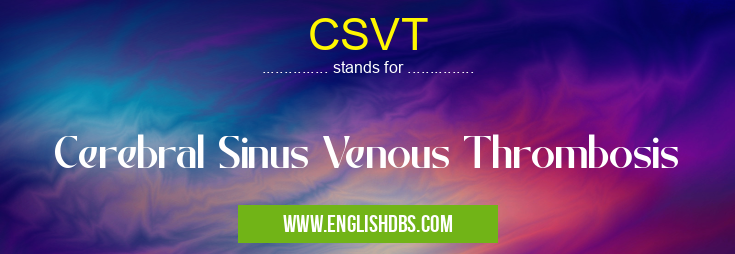What does CSVT mean in MEDICAL
Cerebral Sinus Venous Thrombosis (CSVT) is a rare but serious condition that occurs when there is a blockage of the brain's venous sinuses, which are channels that drain blood from the brain. This blockage can disrupt the normal flow of blood, leading to a dangerous increase in pressure within the brain.

CSVT meaning in Medical in Medical
CSVT mostly used in an acronym Medical in Category Medical that means Cerebral Sinus Venous Thrombosis
Shorthand: CSVT,
Full Form: Cerebral Sinus Venous Thrombosis
For more information of "Cerebral Sinus Venous Thrombosis", see the section below.
Symptoms of CSVT
- Headaches: Severe, worsening headaches that are often described as "thunderclap" headaches
- Seizures: Sudden loss of consciousness and uncontrolled movements
- Focal neurologic deficits: Weakness or numbness on one side of the body, difficulty speaking or understanding speech
- Papilledema: Swelling of the optic nerve, which can be seen during an eye exam
- Tinnitus: Ringing or buzzing in the ears
- Nausea and vomiting
Diagnosis of CSVT
Diagnosing CSVT can be challenging, as the symptoms can mimic those of other conditions. A thorough medical history, physical examination, and neuroimaging tests are typically used to confirm the diagnosis. Neuroimaging tests may include:
- Computed tomography (CT) scan: A special X-ray that provides detailed images of the brain
- Magnetic resonance imaging (MRI): A test that uses magnetic fields and radio waves to create detailed images of the brain and blood vessels
Treatment of CSVT
Treatment for CSVT typically involves anticoagulants, which are medications that prevent blood clots. These medications are usually given intravenously (through a vein) initially and then continued orally for several months. In some cases, surgery may be necessary to remove the blood clot.
Essential Questions and Answers on Cerebral Sinus Venous Thrombosis in "MEDICAL»MEDICAL"
What is Cerebral Sinus Venous Thrombosis (CSVT)?
CSVT is a rare but serious condition that occurs when blood clots form in the veins that drain blood from the brain. These veins are called sinuses. When a sinus is blocked by a clot, blood can't flow out of the brain properly. This can lead to a buildup of pressure in the brain and swelling.
What are the symptoms of CSVT?
The symptoms of CSVT can vary depending on the location and size of the clot. Some common symptoms include:
- Headache
- Vision problems
- Nausea and vomiting
- Seizures
- Weakness or numbness on one side of the body
- Difficulty speaking
- Confusion
- Loss of consciousness
What causes CSVT?
CSVT can be caused by a variety of factors, including:
- Head injuries
- Infections
- Certain medical conditions, such as cancer or blood clotting disorders
- Taking certain medications, such as birth control pills or hormone replacement therapy
- Pregnancy
How is CSVT diagnosed?
CSVT is diagnosed using a variety of tests, including:
- Physical exam
- Blood tests
- Imaging tests, such as MRI or CT scan
How is CSVT treated?
The treatment for CSVT depends on the location and size of the clot. Treatment may include:
- Medications to dissolve the clot
- Surgery to remove the clot
- Supportive care, such as pain medication and fluids
What is the prognosis for CSVT?
The prognosis for CSVT depends on the severity of the condition and how quickly it is treated. With early diagnosis and treatment, most people with CSVT make a full recovery. However, some people may have long-term problems, such as headaches, seizures, or vision problems.
Final Words: CSVT is a serious condition that requires prompt diagnosis and treatment. Early detection and intervention can help improve outcomes and prevent permanent neurological damage. If you experience any of the symptoms associated with CSVT, it is important to seek immediate medical attention.
